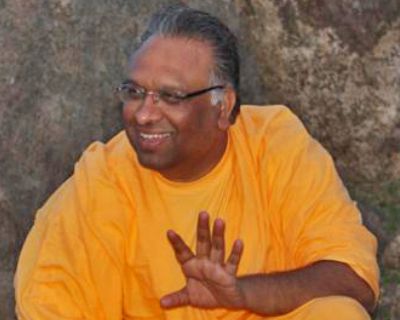- Part 1
- Part 2
Absence of bhoga (enjoyment) is often considered Vairāgya. The incessant craving to enjoy is, by itself, considered absence of Vairāgya. The restlessness to enjoy, and finding rest only when appeased is further noted as a deep absence of Vairāgya. To experience disgust or distaste in the face of objects of enjoyment, or to restrain oneself and not fall for temptation, is deemed Vairāgya by many others. Some may consider as Vairāgya, the vigilance within that doesn’t allow one to fall for the charms of the object itself. Others may deem such vigilance as constant worry, and instead, seek to analyse the object and the pleasure it gives as well as the various charming ways by which it seduces; analyse in such a manner that the object ceases to enthral. Such analysis in the throes of acute enticement would be deemed Vairāgya; to fall first and then withdraw from its clutches would be mediocre and foolish. Some others may say memory is the real issue when it comes to enjoyment; if you merely enjoyed but didn’t carry it along with you, which meant that you don’t ruminate over it or keep it to relish later, but if you enjoyed it and left it then and there, it is Vairāgya indeed. Some monks come up with more severe definitions: unavailability of yourself to the sense objects and the fields of enjoyment itself is Vairāgya. You aren’t available for the object or person or anything there to entice you in the first place!
In other words, each of us has some attitude towards enjoyment and objects that give us pleasure, which leads to multiple definitions of Vairāgya within. Whatever be the definition, each of us experiences pleasure differently, crave for it differently, and seek to play with the objects of pleasure differently. So, the definition of Vairāgya must emanate from one’s observation of oneself, from a deeper study of one’s weaknesses, distractions, happiness experiences, experiences of temporary release, how much sex or any other form of bhoga matters to one, hesitation or worry either to indulge or withdraw, fear of being trapped, so on and so forth.
Pleasure in some form is central to our lives, and absence of pleasure makes life morose, dull, listless, and even meaningless. You and I have declared to ourselves that happiness is indeed the goal and purpose of life here. Happiness is our world view; it is our community view, as well as the immediate family view. We want everyone to be happy. And therefore, if someone out there appears genuinely happy, we either join them in that happiness or are acutely jealous that that person has found something that we are yet to discover. Doesn’t this clearly indicate that pleasure is the central pivot of our lives?
Well, to talk of Vairāgya would be sheer hypocrisy if you haven’t discovered anything outside happiness, joy, or pleasure to pursue in life. If you haven’t found anything worthy in this Universe outside happiness and joy and pleasure, then any talk of Vairāgya itself is quite wasted. Saints are aware of our weakness and myopia about pleasure, and our incessant nag about the quality or level of happiness, and in order to accommodate everyone, they seem to have defined enlightenment, or self-realisation, or Mokṣa, in terms of pleasure—absolute bliss, sea of ecstasy, unconditioned and unalloyed happiness, doubtless happiness because of no dearth, end of craving and being ushered into an orbit of distilled joy, happiness that is free of defects like fear, inhibition, and plotting, so on and so forth.
The corruption is complete. We have converted the destination into a crystallised experience of undying pleasure, and naturally, why wouldn’t we pursue pleasure today in order to achieve that destination? On a different note, we would even be ready to sacrifice transient pleasure, ready to go through temporary denial and starvation, so that we reach such a destination of exalted pleasure, isn’t it?
First and foremost, Vairāgya is a readiness to concede that happiness may not be the purpose, destination, or content of life.
Just a readiness to seriously consider within. At least a strong doubt! That God hasn’t created this elaborate mechanism of this Universe, designed an 80-year life-span for me, only so that I end up being happy! Why such an intricate and elaborate design if the purpose was to merely make me seek happiness, gain it, and live it? Such a substantive doubt itself is indeed the beginning of Vairāgya.
There is a deeper sense to Vairāgya. The agency of the soul. Let me illustrate with an example.
What do we understand as authoritarianism? The tendency to convert everything and everybody around you into an instrument for your belief, ideology, dream, or plot, right? That definition is adequate for the purpose of our illustration. Suppose you have a person who knows no other way to deal or work with people or institutions or established methods/procedures/conventions, but to use them as instruments for his purpose. The purpose he envisages could be noble or ignoble. The overall purpose could be noble, while action to action, there could be plots. Or, the broad purpose itself could be evil, and the tyrant could use every opportunity to increase his control. Either way, he would first go about trying to get the people and institutions and processes around to supplicate themselves to him. Either by convincing, charming, forcing, or eliminating. Eliminate those who don’t fall in line. And, achieve clarity with respect to the rest: fall in line, or else…! For an authoritarian person, it is a must that he ensures things and people and institutions around him listen to him, work for him, stay loyal to him, and that his master-ship is never under question.
This way, the authoritarian leader tends to find the freedom to do what he set out to do. His agenda becomes known only after everyone around has been forced to supplicate. That is when he expresses himself. Do you get the picture?
Now, let’s come back to the subject of the article. Consider the soul, which is born into this world with an agenda, motive, purpose, dream, want, craving, desperation, or whatever. It tends to use the body as the immediate instrument. It tends to use all the natural gifts that God has endowed the personality with for the very same purpose. It wants to increase its control in such a manner so that it finds the freedom to execute its agenda. In other words, the soul not only seeks to create a platform for its operation here but also wants to be able to control it completely.
Control everything for what? To execute something from within. The desperation and exasperation, as well as the anxiety, is only because one is unable to achieve that zone of freedom, where one can express oneself completely, in full freedom. Suppose the world or the immediate family or the scenario around doesn’t allow for such freedom? Either the soul stays unexpressed or waits for the opportune moment to create the situation conducive to itself.
In other words, just like the case of the authoritarian leader, its true motives and agendas lie hidden in its sub-conscious mind, and they shall all express themselves only when there comes about a conducive atmosphere, which the soul itself can control. If the soul were to be asked, ‘What do you want here? What do you want to achieve or gain? What are your fears? What are you fighting for or against? What do you plot for? What do you seek?’, the soul would genuinely be unable to answer.
Interaction becomes difficult with such a soul. Because, it is always struggling with something on the inside, while unable to express itself outside. And, of course, it has a thousand complaints about how people around it are. You get the picture, don’t you?
So, what is Vairāgya now? Merely stopping bhoga/enjoyment cannot be Vairāgya. General restraint or vigilance about objects of enjoyment is not going to help either. In fact, if you let the soul go seek enjoyment, maybe it may have allowed the subconscious mind to express itself. So, what exactly would be Vairāgya then?
The soul must first stop organising a freedom zone for itself. Which means it must stop seeking to convert things and people around it to become convenient to it, or become its instruments. In short, it must let go of control. Control is choice. By this, the soul shall be left with no other choice but to express what lies in its sub-conscious directly.
When I say to the world, ‘this is my dream, this is my want, this shall make me secure, this shall make me composed and settled, this will make me happy’, the world may agree, disagree, not care, or merely make a note without acting. Isn’t that the fact? The world is free to respond; it has a mind of its own.
So, Vairāgya is when the soul doesn’t create compartments of conscious and sub-conscious within itself, when it doesn’t hide its agendas and hurts and dreams deep down within itself, and learns to express itself as it is, to the world around it. Why am I calling this as Vairāgya, you may ask. Because, mere desire, mere enjoyment is far less harmful.
Imagine a monk or orthodox Brahmin who has suppressed a desire to drink wine. And, he doesn’t even know this, let us say, because it is deeply embedded within his sub-conscious. Now, the soul is continually seeking people who are likely to accept his desire without him specifying the same. Instinctively, the soul seeks such an atmosphere, let us say. Say, the monk or the orthodox Brahmin finds all the freedom his soul seeks, and it is finally known that all this fight for freedom is only to drink wine. You get the picture, don’t you? The agenda that one has hidden within is so silly, but the demand for freedom to express the same is so intense, even violent.
What gets hidden in the subconscious is often silly, ill-thought, or merely a fancy; not even a beautiful vision, dream, or a great human possibility. But, the germinations of the same in the conscious mind, as well as the world outside, can turn so powerful, demanding, authoritarian, and even violent, and set the soul increasingly away from self-reflection and sense.
Such is the case with tyrants and dictators. Hitler, Mussolini, Stalin, or Saddam Hussein. If the world around them had indeed capitulated, become instruments in their hands, what would they have done with such doubtless control placed in their hands? They still have to rule, isn’t it? What will they usher into this world? Would Stalin have descended a real communist dream on earth? Could Hitler have created or sorted a pure race of Aryans? Everyone knows that these are pretexts that the dictator uses. The fight for control and for converting everything into instruments will never cease. The subconscious mind shall never express what it wanted. Because, somewhere along the line, if the dictator did spend a little while in self-reflection, he would have known that the agenda is too silly and cheap. Lesser people have achieved that agenda quite easily, with far less noise. Now, to continue to seek control becomes a matter of prestige.
When an object faces you, promising pleasure and happiness, you are supposed to interact with it; and your heart, by the very quality of interaction, must be able to know (by experience as well as understanding) what it is all about. Such an interaction is simple and straight forward. Say, coffee gives you pleasure today, can it provide the same satisfaction tomorrow too, and what if it doesn’t the day after? There must be a simple way to deal with it. Either say yes or no; why make such a big fuss of it?
So too with life and all the pleasures and experiences and joys and happiness it can give, known or unknown, hidden or well in the light. Vairāgya is a freedom from the entire world of objects, experiences, pleasures, happiness, joys, and delusions. Freedom to see, and easily relate with that object, as well as deal with oneself too. Making the whole thing simpler and untying the knots that complicate.
We shall continue.
The path to God lies in the soul becoming simple first. And, that can happen only when it is willing to surrender every bit of its self-agenda, dream, belief, the plot for happiness, desire, etc. This is Vairāgya. Vairāgya is not when you have stepped out of the stream of life in disgust, or because of a heartbreak, or because of being defeated by life. But because you are free of self-agenda, ideology, ideal, desire, self-worth calculations, and when you step into the world, you shall no longer experience or see the world erected by man—the world of relativity, of jealousy, of envy, of pride, of insecurity, of power, of complicated social structures, of expectations, of exploitation, of working for livelihood, or for protecting family or nation. Instead, you will be ushered into the world created by God, into the actual orbits of purity and aspiration of the soul, into cosmic order and its functioning, into the very origin of the streams of life.
Self-knowledge is still far away, though. But, you receive an exclusive invite into God’s world. And, you can see it working up close, intimately, and be part of its throb. Of course, you can’t tamper with it, or change its course; you are too small to even think of such things. You are only blessed that God has opened it up all for you, to see and walk into. To worship. To adore. To gush. To feel blessed. To celebrate. To sing and dance. To love. To participate fully. To invoke.
Consider this scenario. There is a singer who is born with a gifted voice. And, right from a young age, musicians in particular have shown a lot of interest in the kind of prodigious talent he displays, let us say. Even the boy doesn’t know why he is so gifted, nor does he know the value of the gift that he possesses. At least, as long as he lives in the ‘age of innocence’! Good music teachers would want to install in the boy good values and practices much before he comes into the world of the ego so that his music doesn’t wilt under this rude waking up of the ego. On the other hand, there could be many modern teachers too who will allow the boy to remain the way he is while still in the world of innocence, and when dragged into the world of the ego, they would expect that he would learn the issues of being a human living in a human world facing human problems, as much as anyone else.
In other words, when the ego arises, it is expected that the boy’s entire demeanour, as well as the way he wields his music, shall change. And, likely change for the worse! He could put up tantrums, expect a lot of ego massage and appeasement, pile considerable self-esteem in the smallest of things and react bitterly or violently if things don’t go his way, not receive criticism well, try to wield clout in all the musical groups, etc. Of course, he shall show goodness here and there, but expect unceasing gratitude for the same too. You get the picture, don’t you?
Simply put, the gift of God (musical talent) doesn’t save the boy from utterly avoiding the world of the ego. He will be ushered into it anyway, probably a little earlier because of this very gift. Which means that the soul there is very likely to use this extraordinary gift to further its agenda more powerfully and ‘impactfully’. Similar to a girl born of royalty, who is likely to wield that inheritance and wealth in a loud and uncouth manner.
The music emanating from there is magical, but the soul that wields it remains an immature kid, or has turned into a gross tyrant. We have seen this unfold in front of our eyes so many times, haven’t we?
One wonders, therefore, whether God should send people with gifts at all, in the first place. But, that is something different from what we are discussing here.
The soul is very likely to wield and control what it owns and possesses. It wants to convert everything it has for its own advantage. And, it is also ashamed of many things that it is born with, born ‘disendowed’, like a handicap or an ugly face or a frail body. All complexes, superior or inferior, emanate from what is good to possess, and what is bad to possess but still can’t be ‘unpossessed’. If someone is born with an obese body, she can’t shake it off easily, can she? Life-long, the soul remains unable to carry that body gracefully. It is full of complaints and curses, and tends to react quickly. Once it realises that it can’t change the situation, it becomes a defender of the same. That obese body becomes a sore spot either ways, doesn’t it?
So, Vairāgya is when the soul gets off all these: complexes, agendas, deployment of good abilities and faculties forcefully, hiding or being ashamed of bad abilities and faculties, the vanity born of superior faculties, the desperation born of poor endowments, etc. In other words, when the soul no longer exerts control or choice, it no longer shall use what it has for an effect it wants to create, it shall no longer erect a positive picture of itself when it doesn’t have the faculties or worthiness to match. You get the point, don’t you?
Simply put, the soul doesn’t wield anything that it has. And, since there exists no agenda that drives the soul, there is no attempt to control things too. You will neither be looking for a free atmosphere to be yourself, nor will you seek to leave ‘your imprint’ on things here, so that you can function freely. Of course, we are painting an extreme picture here of pure Vairāgya, if such a thing were to be possible. But, such an extreme picture gives you a better sense of what Vairāgya means, or the direction a mature soul would take.
There is a flip side to this too. Which is what I shall talk about under Dhātuprasāda. Dhātu means substance, material, or ingredient, like saptadhātu. Broadly it means Prakṛti. Prasāda means grace or blessing. So, Dhātuprasāda means ‘blessing, grace, or wishing well by Prakṛti’. Of course, I have borrowed this word from the Kaṭhopaniṣad (1.2.20).
तमक्रतुः पश्यति वीतशोको धातुप्रसादान्महिमानमात्मनः
Tamakratuḥ paśyati vītaśoko
dhātuprasādānmahimānamātmanaḥ
We must understand the employer-employed relationship better. As much as the singer (employer) wants to wield her excellent voice, she wants proper tutelage, supporting family, right stage, appreciative audience, good organisers, perfect sound system to render a great performance. So too, each of the employed (family, teacher, tradition, organiser, audience), need a great singer for them to achieve what they want to achieve. Isn’t it? It is, in fact, a symbiotic relationship. Both depend on each other, for mutual happiness, well-being, expression, utility, as well as glory.
Similarly, when the soul (the employer) enters the body, it is gifting the inert Prakṛti (the employed) an opportunity to be great. Else, the physical apparatus of ours is merely chemicals, molecules, organs—a set of inert things—assembled together. A collection of non-worthy things, apparently! But, look at how it gets cherished, valued, utilised, and made to feel worthy, once a soul enters these very inert elements and assembles them for its purpose. Similarly, when you sing well, there is something of Prakṛti that feels utilised well, that experiences worthiness.
Let us examine this relationship a little closer. As much as the soul seeks a perfect employee (body, mind, etc.), so too, the employee seeks a perfect boss. In a moment of whim or fit, you may decide that you should reduce your weight by 10 kgs, and chalk out a programme of diet and exercise quickly. That hardly takes time, does it? Now, that is the soul giving targets to the body and mind! In one urgently summoned meeting! And, the body and mind are expected to execute that regimen for the next 3 or 4 months consistently, with interest, with vigour, with enthusiasm, with no thought of ever giving up. Plain execution with the least grumble or noise! And, if the body and mind cooperate, the targets are achieved, which means now, you are able to go into client meetings with renewed confidence, and you can expect people to look at you admiringly, you will give a pat to your body and indulge it with rich food for a day, just like you would treat your pet dog. Right?
Now, suppose your body and mind don’t cooperate in this grand image-renewal program of yours, they don’t match up to the demands of the situation swiftly, if they act like cumbersome and clumsy naukars, you shall feel thwarted, remain frustrated, and sulk a lot. Won’t you? And, if this starts becoming a trend, where you are again and again outwitted by your naukars, where even the smallest of your wishes aren’t getting fulfilled quickly and easily, you begin to feel you have lost it. Don’t you? You begin wondering whether this is age-related, or is it temporary, but the overall pall of bleakness starts setting in. You may start avoiding the company of ‘efficient’ people, whose whims and fancies are readily obeyed by their bodies and minds, and settle with new friends and accompaniments, who have long given up directing their bodies and minds.
We have just laid out the issue of the soul. The soul seeks convenient bodies, minds, faculties, and environments to execute its agenda. Of course, never self-reflecting that it could be fundamentally wrong in its pursuit itself. The body and mind, or the faculties—in short everything that can be deemed as Prakṛti—have a sense of their own. They joined this deal with the soul so that they could also find some glory through this partnership and collaboration. But, as much as the soul remains dejected if things don’t turn out according to plan, so too, Prakṛti is disappointed.
What do smart souls do? They invent the ‘use and throw’ mechanism! Use the faculty, use the equipment, use the structure, use all of it, so long as it is convenient, so long as it is useful to oneself, so long as it remains wieldy, so long as the partnership has some momentum and juice to it. Else, don’t hesitate to throw it away, or keep a distance from such a structure or equipment or group of people etc. Just give them up! Seek a new stage, a new platform, a new set of people, a new structure of work and living, a new paradigm of economics, and by extension of the same logic, a new body and mind, and keep living the way you want to live, commanding Prakṛti to obey, adhere, stay loyal, discharge what is asked of it, so on and so forth. Remain the maalik always, and keep changing the naukars or the environment till it clicks for you.
Well, this seems the scheme of the soul, and this seems the reason why it keeps transmigrating from this body to the next and to the next, continuing this journey, and constantly looking for new bodies, faculties, equipment, and structures to take charge, rule, leave an imprint, deliver happiness, and go on.
Well, Prakṛti too is smart enough. It doesn’t seem to have the power to hold the soul to itself, if the soul is intent on having a new body or faculty or equipment or structure. So, while the body and mind are being used currently, they leave marks and scars on the soul, by which hooks are created, and that is how Prakṛti clings to the Puruṣa, the soul. Such clinging becomes a burden for the soul, and it is continuously trying to abandon its burden, fly with lightness, and so on. Isn’t it?
So, the soul, the Puruṣa, thinks it can get away easily after using Prakṛti, but Prakṛti ensures that the soul can’t get away easily. It leaves behind impressions, marks, wounds, and scars, which aren’t easy for the soul to wipe off. And, these impressions get the soul back to employ the very same faculty or equipment it had abandoned in the past. Suppose you had enjoyed music once upon a time, and twenty years later you detest music now, and you want to get away from it, in spite of your best efforts, music doesn’t leave you. Because, while you indulged, music left behind scars and marks on your soul, and through those hooks it created back then, it clings to you now.
Prakṛti isn’t easily dispensable!
True detachment begins only when the soul, Puruṣa, gives up the ‘employer-employed’ attitude with respect to Prakṛti. The Puruṣa begins by saying, ‘Look, I don’t want to be tied. And, I don’t want you to leave any scars on me too. I don’t want you to hold me clandestinely too. Let this whole thing be in the open. I seek your collaboration for something; you want my presence for something. Let us deal with each other on a case to case basis, moment to moment. I won’t own or employ you forever, and hence, you won’t be the reason for my vanity.’
Try saying such a thing either in a relationship, or in institution-building, or nation-building, or in the nurturing of a family. Or, to your voice, if you are a successful professional singer. You will find that Prakṛti will not cooperate! It shall want certainty, assurances, guarantees. In other words, Prakṛti trusts those guarantees, those structures, those identities, because that is the way it holds you, the Puruṣa, accountable. If the Puruṣa genuinely says that I have no such long-term vision, dream, or plan, for which I need long-term employment or loyalty, but I want to take it day by day, hour by hour, year by year, then it shall be some time before Prakṛti is willing to join in such a collaboration.
Where Puruṣa won’t be the maalik, and Prakṛti won’t be the naukar. And, this shall be a more intimate engagement. More intricate engagement too. Very purposeful and meaningful. Very constructive. Every delusion of the soul shall be lost. Every fear and hesitation of Prakṛti shall also be lost.
We defined Vairāgya as that when the soul, the Puruṣa, no longer employs Prakṛti as its loyal servant. Dhātuprasāda is when Prakṛti no longer leaves any scar, imprint, impression, and doesn’t hook the soul anymore. When Prakṛti flows in utter grace, without inhibition, fully, and with no fear of being abandoned, that is Dhātuprasāda, the blessing of Prakṛti.
Therefore, Vairāgya and Dhātuprasāda go together. One can’t proceed without the other.








